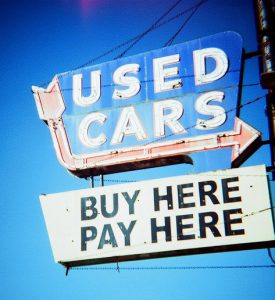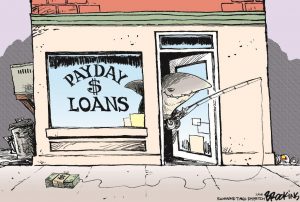 Consumers who over-pay for financial services are more at risk to become trapped in a cycle of poverty. Access to your money costs more when you are poor. Said another way, you have to have more money to use your money when you are poor, rendering you more poor. Utilizing the services of mainstream financial institutions is one step in the direction away from the cycle of poverty. Let’s take a closer look at why people go outside of mainstream banking to obtain services.
Consumers who over-pay for financial services are more at risk to become trapped in a cycle of poverty. Access to your money costs more when you are poor. Said another way, you have to have more money to use your money when you are poor, rendering you more poor. Utilizing the services of mainstream financial institutions is one step in the direction away from the cycle of poverty. Let’s take a closer look at why people go outside of mainstream banking to obtain services.
Why
Research finds the primary reason consumers are unbanked and underbanked has to do with income and the perceived cost of mainstream banking. Other reasons include personal beliefs (dislike or distrust of banks, cultural conflicts, etc.), negative banking experiences (bad credit, check-writing history), lack of identification or documentation, unstable living situation, and a perceived convenience that alternative options offer.
What
The term unbanked defines a consumer who doesn’t utilize the services of a mainstream financial institution. These households go outside the banking system to pay bills and receive income (cash checks) in a typical month. An underbanked consumer has a bank account but also obtains financial services and products from other sources.
Who
One in thirteen households in the United States are unbanked or underbanked. In 2015, nine million households of U.S. households were unbanked and almost 24.5 million were underbanked. Households with less education, low income, minorities, female-headed households, young adults, immigrants, and comprise this cluster. More than one in five U.S. households have income that varies from month to month and these households are more likely to be unbanked and underbanked. Consumers with volatile income have to monitor account balances closely to avoid additional fees if their balances goes below a require minimum or if they bounce a check and so on. Additional fees add up when missteps occur.
How
 Consumers who underutilize banking services miss out on the benefits of three key factors that contribute to increasing net worth. Interest rates and fees associated with credit, check cashing, and saving are assessed at higher rates for unbanked and underbanked households.
Consumers who underutilize banking services miss out on the benefits of three key factors that contribute to increasing net worth. Interest rates and fees associated with credit, check cashing, and saving are assessed at higher rates for unbanked and underbanked households.
1. Credit
Unbanked and underbanked consumers miss the perks that mainstream banking affords, most importantly building a credit history that is more than a basis for loan decision-making. Credit worthiness is also factored into employment and housing decisions. Paying alternative operations for credit services is extremely costly. Buy-here/pay-here businesses, payday lenders, rent-to-own operations and the like function under a business model that keeps borrowers heavily encumbered, commonly rendering them unable to keep current on daily living expenses including food, housing, and transportation. Payday lenders’ sustainability and profitability depend on repeat business and 99% of their customers are repeats. The typical fee for a $100 two-week loan is $15. This equates to an APR of 391%!
2. Check Cashing
 Some of the highest fees for financial services are assessed by check cashing outlets called neighborhood financial-service centers. Over the course of a lifetime, the decision to cash paychecks at one of these can result in paying over $40,000 in cashing fees! Consumers also pay significant check cashing fees to alternative financial providers such as grocery or convenience stores.
Some of the highest fees for financial services are assessed by check cashing outlets called neighborhood financial-service centers. Over the course of a lifetime, the decision to cash paychecks at one of these can result in paying over $40,000 in cashing fees! Consumers also pay significant check cashing fees to alternative financial providers such as grocery or convenience stores.
3. Saving
Unbanked households keep their stash in the home or with family or friends, increasing the chances of having it lost or stolen and also losing the benefit of their money being federally insured. Access to mainstream financial services at an insured depository institution provides consumers with a safe place to save, conduct basic financial transactions, and build a credit history and access credit on favorable terms.
So What?
 Bank account ownership improves a person’s ability to manage money, make significant financial decisions regarding education, homeownership, health care, employment, and retirement. Research indicates that people who own bank accounts are more likely to own other assets including accounts related to savings, credit, and insurance. Handling payments through a bank account provides a gateway for households to enter the pipeline to become owners of financial assets and grow their net worth. Those without financial accounts are less likely to own a home and reliable transportation.
Bank account ownership improves a person’s ability to manage money, make significant financial decisions regarding education, homeownership, health care, employment, and retirement. Research indicates that people who own bank accounts are more likely to own other assets including accounts related to savings, credit, and insurance. Handling payments through a bank account provides a gateway for households to enter the pipeline to become owners of financial assets and grow their net worth. Those without financial accounts are less likely to own a home and reliable transportation.
Going forward
Financial institutions understand the need and recognize the information gap. They are making changes to attract and educate potential customers about the advantages of utilizing mainstream banking services such as one-on-one financial counseling and low-cost accounts with low minimum balance requirements. With an established relationship, these households could eventually access lower-cost bank credit and increase their financial security.
 0
0
